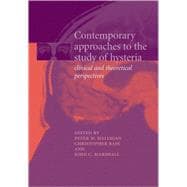
Note: Supplemental materials are not guaranteed with Rental or Used book purchases.
Purchase Benefits
What is included with this book?
| List of contributors | p. vii |
| Acknowledgements | p. ix |
| Introduction | p. x |
| History | |
| All in the mind? the history of hysterical conversion as a clinical concept | p. 1 |
| War based hysteria--the military perspective | p. 12 |
| Recovering hysteria from history: Herodotus and 'the first case of shell-shock' | p. 36 |
| Classification and Epidemiology | |
| The origins of DSM and ICD--criteria for conversion and somatization disorders | p. 49 |
| Discrepancies between diagnostic criteria and clinical practice | p. 63 |
| The epidemiology of hysterical conversion | p. 73 |
| Aeteological, Clinical and Legal Perspectives | |
| Life events: meanings and precursors | p. 88 |
| Hysterical conversion--a view from clinical neurology | p. 102 |
| Factitious disorders and malingering | p. 126 |
| Non-epileptic seizures | p. 143 |
| Conversion hysteria: a legal diagnosis | p. 155 |
| Theoretical Perspectives | |
| Conversion, dissociation, or doxomorphic disorder | p. 171 |
| Psychodynamic theories in conversion hysteria | p. 184 |
| Conversion hysteria: the relevance of attentional awareness | p. 192 |
| Hysteria and hypnosis: cognitive and social influences | p. 203 |
| Imaging hysterical paralysis | p. 216 |
| Disorders of willed action | p. 235 |
| The anthropology of hysteria | p. 251 |
| Prognosis and Management | |
| The prognosis of hysteria/somatization disorder | p. 271 |
| Psychodynamic psychotherapy in the treatment of conversion hysteria | p. 283 |
| Cognitive behavioural therapy as a treatment for conversion disorders | p. 298 |
| Hypnosis and suggestion in the treatment of hysteria | p. 312 |
| Rehabilitation for hysterical conversion | p. 330 |
| Index | p. 347 |
| Table of Contents provided by Syndetics. All Rights Reserved. |
The New copy of this book will include any supplemental materials advertised. Please check the title of the book to determine if it should include any access cards, study guides, lab manuals, CDs, etc.
The Used, Rental and eBook copies of this book are not guaranteed to include any supplemental materials. Typically, only the book itself is included. This is true even if the title states it includes any access cards, study guides, lab manuals, CDs, etc.